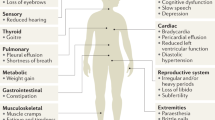Summary
The objective of this study was to evaluate parameters of thyroid function and indices of peripheral thyroid hormone action (such as SHBG) in patients whose hypothyroidism was considered well controlled under current criteria. Eighty-five patients with T4-treated hypothyroidism, 28 of whom had athyria, were compared with 114 normal individuals with the same TSH levels. T3 levels were significantly lower in hypothyroidism although mean T4 and fT4 levels were significantly higher. Furthermore, mean SHBG levels were significantly lower in hypothyroidism independently of age. The difference remained when stricter criteria for adequate treatment were applied (TSH, <2.5 μU/ml). Significant negative correlations were found between logTSH and T3. The slopes of the regression lines of T3 to TSH were significantly different in the control group and the hypothyroid group: thus, for the same TSH levels, T3 levels were lower in the hypothyroid group. We conclude that patients with T4-treated hypothyroidism have lower T3 levels, lower T3/T4 ratio and lower SHBG than normal individuals with the same TSH, perhaps indicating relative tissue hypothyroidism in the liver. TSH levels used to monitor substitution, mostly regulated by intracellular T3 in the pituitary, may not be such a good indicator of adequate thyroid hormone action in all tissues. The co-administration of T3 may prove more effective in this respect, provided novel suitable preparations are developed. Until this is accomplished, substitution in hypothyroidism should aim at low normal TSH, to ensure normal T3 levels.
Zusammenfassung
Ziel dieser Studie war es, Parameter der Schilddrüsenfunktion sowie Indikatoren der peripheren Wirkung von Schilddrüsenhormonen (wie zum Beispiel SHBG) in nach gängigen Kriterien gut substituierten hypothyreoten Patienten zu evaluieren. 85 T4-behandelte hypothyreote Patienten (28 davon athyreot) wurden mit 114 normalen Individuen mit der gleichen TSH-Serumkonzentration verglichen. Trotz gleichen TSH-Spiegels waren die T3-Spiegel bei den hypothyreoten Patienten signifikant niedriger als in den 114 euthyreoten Individuen. Diese Differenz blieb auch, wenn nur die Patienten und Normalpersonen mit einem TSH von <2,5 mU/l verglichen wurden. Außerdem wurden signifikant negative Korrelationen zwischen logTSH und T3 gefunden, wobei eine signifikante Differenz im Slope der Regressionslinien in der Kontrollgruppe und den hypothyreoten Patienten bestand: Bei gleichem TSH war das T3 bei den substituierten hypothyreoten Patienten niedriger als bei der Kontrolle. T4-behandelte hypothyreote Patienten weisen im Vergleich zu Gesunden niedrigere T3-Spiegel, einen niedrigeren T3/T4-Quotienten und ein niedrigeres SHBG bei gleichem TSH auf. Möglicherweise stellt das einen Hinweis auf eine relative Gewebshypothyreose in der Leber dar. Wir schließen daraus, dass die Verwendung von TSH-Serumspiegel als Monitor der adäquaten Substitution vielleicht doch nicht über alle Gewebe Auskunft gibt. Die zusätzliche Gabe von T3 im richtigen Dosierungsverhältnis könnte sich vielleicht als wirkungsvoller in der Behebung solcher Gewebshypothyreosen herausstellen. Bis es solche Kombinationspräparate gibt, sollten hypothyreote Patienten in einen Bereich mit niedrig normalem TSH substituiert werden.
Similar content being viewed by others
Author information
Authors and Affiliations
Corresponding author
Rights and permissions
About this article
Cite this article
Alevizaki, M., Mantzou, E., Cimponeriu, A.T. et al. TSH may not be a good marker for adequate thyroid hormone replacement therapy. Wien Klin Wochenschr 117, 636–640 (2005). https://doi.org/10.1007/s00508-005-0421-0
Received:
Accepted:
Issue Date:
DOI: https://doi.org/10.1007/s00508-005-0421-0




